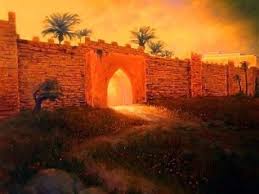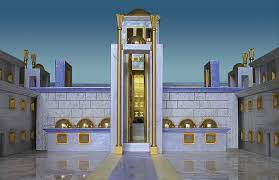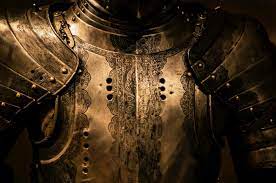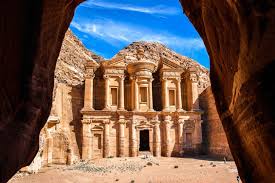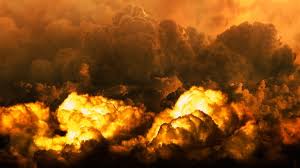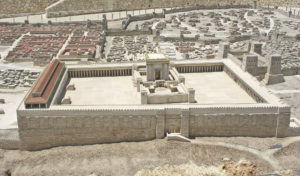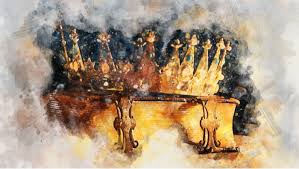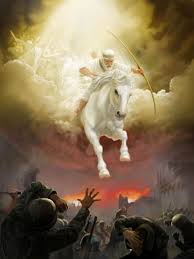Jx – You Will Call Your Walls Salvation and Your Gates Praise 60: 15-22
You Will Call Your Walls Salvation
and Your Gates Praise
60: 15-22
You will call your walls salvation and your gates praise DIG: How long does the Lord say that the Jews will possess the land of Isra’el? Why is that so? How does this relate to world events today? How does this song (60:1-22) parallel the whole movement of the believer’s experience from conversion, to spiritual growth, to eternity with Yeshua Messiah?
REFLECT: What is the relationship between peace and righteousness? What would be different if those qualities were seen in your family today? Your neighborhood? Your world? The world? How can these verses encourage you at a time when it seems that peace and righteousness are absent from your life? How has the LORD kept His promises to you?

Although you have been forsaken and hated, with no one traveling through, I will make you the everlasting pride and the joy of all generations (60:15). Here Isaiah contrasts the former condition of the nation as exemplified by the city of Jerusalem, with its latter condition. The emphasis is on the changed condition. Once the City was forsaken and hated. Now it will be the everlasting pride and the joy of all generations. We can learn a valuable lesson from this. If we abandon all attempts to pay tribute to ourselves and allow God to be God, then He will delight in lifting us up with Him (57:15). To some degree or another, the entire book of Isaiah from Chapter 2 on has been about this truth. The same can be said of joy. The only true joy comes from ADONAI, and any attempt to produce it on our own terms can only be doomed to failure. There is only one place of true joy, submission to Jesus Christ.
You will drink the milk of nations and be nursed at royal breasts. Much as a nursing child gets sustenance from its mother, so Isra’el will be sustained by the wealth of the nations (60:5, 11 16 and 61:6). Kings will bestow their wealth upon Isra’el and they will know He is their God, their Savior, their Redeemer because He has been willing to act as Next-of-Kin and shoulder the needs of His people. Then you will know that I, the LORD, the Mighty One of Jacob, am your Savior and your Redeemer (60:16). This is the point that God has been trying to drive home to Isra’el and to the world at least since Chapter 40. Throughout Isra’el’s history, God’s purpose was that they should know Him. Why? Because only through the knowledge of Him is there any hope of our reaching the possibilities for which we were created. Thus, God says the exodus was all in order that they may know Him. And so it was also in the establishment of Isra’el in the Promised Land, in the return from exile in Babylon, in the coming of the Messiah, and now, here, in the culmination of all things.242
In language reminiscent of First Kings 10:21 and 17, Isaiah speaks of the glory that God will give to the City as He replaces the good with the best. As a result, Jerusalem will be exalted and precious metals will become commonplace. Instead of bronze I will bring you gold, and silver in place of iron. Instead of wood I will bring you bronze, and iron in place of stones (60:17a). These are simply poetic ways of talking about the wonder of living under the blessing of God as opposed to every other way of life. Spiritually speaking, it is to know the best, to know a permanence that cannot fade away, to know a security that no enemy can break through.
The social transformation will match the material well-being. I will make shalom, peace, your governor and righteousness your ruler (60:17). In Hebrew, peace and governor are in apposition, meaning each is the same definition of the other. To say peace is to say governor and to say governor is to say peace. The word ruler is the exact word used in Exodus 3:7 for slave drivers. The very worst of their past exemplified by the oppressive rule of Pharaoh, will become the very best that ADONAI has to offer. During this time of blessing, righteousness will be evident throughout the Land.
Jerusalem during the Messianic Kingdom will be a place of permanency and security. No longer will violence be heard in your Land, nor ruin or destruction within your borders, but you will call your walls Salvation and your gates Praise (60:18). These two words balance each other. Salvation is what God offers; praise is how we respond. Peace (26:1-3), righteousness, and joy will permeate the Kingdom. There will no longer be violence, nor ruin or destruction within the borders of Isra’el because every knee will have bowed to Him (Philippians 2:10-11). The salvation of the LORD will be the walls, protecting all from the greatest enemy of all: sin.
Why will Jerusalem be a place of permanency and security during the Messianic Kingdom? Because Yeshua Messiah, the light of the world (John 8:12), will be there (to see link click Db – The Nine Missing Articles in the Messiah’s Coming Temple). These verses climax the references to the light of God in Chapter 60. The sun will no more be your light by day, nor will the brightness of the moon shine on you, for the LORD will be your everlasting light, and your God will be your Sh’khinah glory. Your sun will never set again, and your moon will wane no more for ADONAI will be your everlasting light (60:19-20a). In the old order of creation, life was rigidly controlled by day and night, by the ever-changing orbit of the sun and the moon. But in the new order of salvation the guiding principle will be the unchanging presence of His Sh’khinah glory. Consequently, there will be no need for the sun by day, or the moon at night.
And then Isaiah adds: Your days of sorrow will end (60:20b). Earlier in 40:2 God had instructed Isaiah to speak tenderly to Jerusalem, and proclaim to her that her warfare had been completed, that her sin had been pardoned, and that she had received from the Lord double for all her sin. The Psalmist wrote that weeping may remain for a night, but rejoicing comes in the morning (Psalm 30:5). Although different words are used, the same thought also appears in 40:2. It often seemed to Isra’el that the night of mourning for its sins and its broken Covenant would never end. Calamity and despair seemed to follow without end (3:26, 24:4, 33:9). But more troubling was her inability to learn from her mistakes and change her behavior (59:10-11). Nonetheless, Isaiah prophesied that daylight would indeed come. The night of mourning would come to an end; more than that – it had been completed. Why? Because Messiah will come in His grace and power (63:1-6). He is the Sun that does not set, and the Moon that will not disappear. Truly, rejoicing comes in the morning.
The last two verses turn from the description of the City to the discussion about the condition of the people in it. Four things are said about them. They are all righteous; they are promised eternal life (see the commentary on The Life of Christ Ms – The Eternal Security of the Believer); they are established by ADONAI for His splendor; and they will be great in number. The prophet writes that at that time, all of your people will be tzaddikim, or righteous, and because they will be righteous they will possess the Land forever (60:21a). Her people will be righteous, displaying God’s splendor. The rabbis of the Mishnah teach from this verse that all Isra’el will have a share in the world to come. However, what the rabbis ignored was that when the prophet said all of your people will be righteous (see 61:3d), he was referring to all of the Jews living at the end of the Messianic Kingdom. He was not referring to every Jew who ever lived, as the sages teach, because the context will not allow it. In addition to that, the Bible teaches that Jesus was no respecter of persons (Matthew 22:16).
In 60:21b the LORD tells us that the Israelites are the shoot I have planted (see 61:3d), the work of My hands, for the display of My splendor (see 61:3d). The phrase the shoot I have planted refers to Isra’el and not the Messiah because of the context. Earlier in 57:13 Isaiah said that those who take refuge in God would possess the Land. That promise is confirmed here. ADONAI will nurture His people like a tender shoot in a vineyard (5:1-7, 27:2-6). They are the work of His hands, and He will weed around them and prune them carefully. Why? So their essential splendor might be known to the world. This is why the character of His people is so important: if the LORD’s true splendor is to be seen through His people, they must reflect His righteousness.
This is why we can depend on Him until the end of time. He is the one constant in the universe. We are in Christ and He is in us (Ephesians 1:1-14). The Ruach Ha’Kodesh takes this imagery even further by making Yeshua the vine and His people the branches. To belong to Him is not only to be planted and tended by Him, but to have His very life flowing through us: I am the vine; you are the branches. If you remain in Me and I in you, you will bear much fruit; apart from Me you can do nothing (John 15:5). This is exactly what Isaiah is speaking of when he promises that by the grace of God we can share in the righteousness of Christ.
Lastly, the nation will also be great in number. The least of you will become a thousand, the smallest a mighty nation (60:22a). This is precisely opposite of 30:17, which states that one of the enemy was able to chase a thousand of Isra’el because she trusted in her military might instead of ADONAI. Now Isaiah sees a day in which that situation is reversed, when out of the tattered remnants of the nation of Isra’el will come a King who would rule the world from a throne made from two crossed pieces of wood, where a handful of His frightened apostles, empowered by the Spirit of God, could shake the world. This is the climax of a theme that runs through the TaNaKh, and the B’rit Chadashah picks up on (First Corinthians 1:26-31). That is the power of the weak, the triumph of the unlikely and the fruitfulness of the barren. The kingdom of God is not built with human strength; it is built by human weakness. It is only through our weakness that the LORD can move. But you, Bethlehem Ephrathah, though you are small among the clans of Judah, out of you will come for Me one who will be Ruler over Isra’el, whose origins are from of old, from ancient times (Micah 5:2).
I Am the LORD; in this time I will do this swiftly (60:22b). In addition, the Lord says that in its time I will do this swiftly. But the Jews would ask, “Why has the Messiah been so long in coming when Isaiah says the LORD will do this swiftly? The rabbis teach that if all Isra’el was righteous, God would swiftly usher in the Messianic Kingdom. But if Isra’el were not righteous, it would come in its destined time. However, 60:21 indicates that when the messianic Kingdom is ushered in, then all of the Jews will be righteous and possess the land forever. So the rabbinical interpretation of 60:22 seems to contradict their interpretation of 60:21 but somehow the rabbis do not see the inconsistency of it all. But as believers, we know that when the appointed time arrived, God sent forth His Son. He was born from a woman, born into a culture in which legalistic perversion of the Torah was the norm, so that He might redeem those in subjection to this legalism and thus enable us to become the children of God (Galatians 4:4; John 1:12b CJB).
As we come to the end of Chapter 60, we can confirm once again that ADONAI is the Promise Keeper. The Good News for us is that because the LORD has kept, and will keep, His promises to Isra’el, He will also keep His promises to you.



